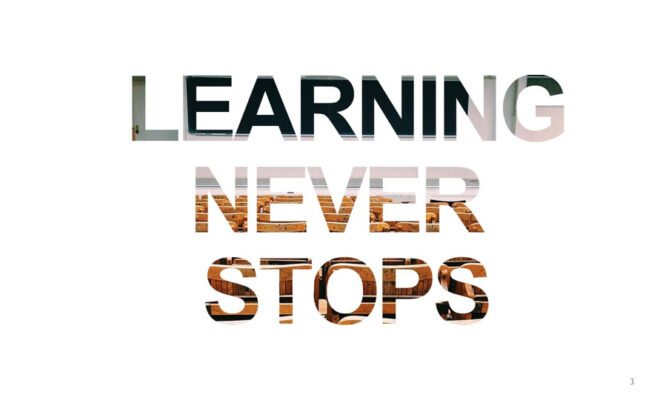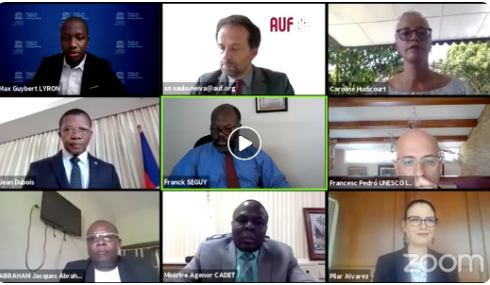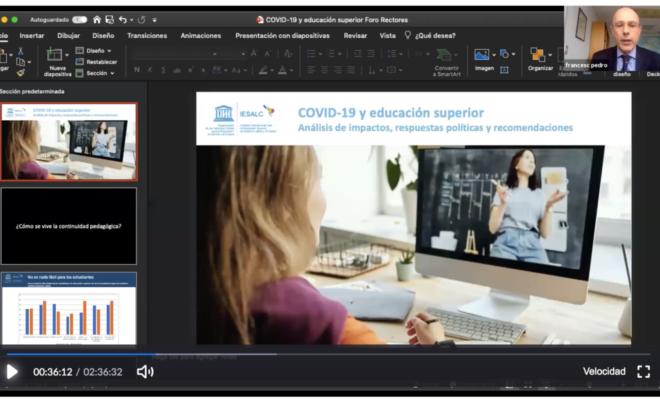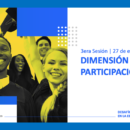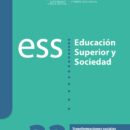2020 Webinars: New Challenges and Opportunities for Higher Education Cooperation in the Americas

 The 2020 Webinar series “From Contingency to Foresight: New Challenges and Opportunities for Cooperation in Higher Education in the Americas” is organized by the Universidad Nacional del Nordeste UNNE (National University of the Northeast) (Argentina), Organización Universitaria Interamericana OUI (Inter-American University Organization) and the Consejo Interuniversitario Nacional CIN (National Inter-University Council) and was scheduled for May 21 at 11 am (Argentina).
The 2020 Webinar series “From Contingency to Foresight: New Challenges and Opportunities for Cooperation in Higher Education in the Americas” is organized by the Universidad Nacional del Nordeste UNNE (National University of the Northeast) (Argentina), Organización Universitaria Interamericana OUI (Inter-American University Organization) and the Consejo Interuniversitario Nacional CIN (National Inter-University Council) and was scheduled for May 21 at 11 am (Argentina).
Francesc Pedró, Director of the UNESCO International Institute for Higher Education in Latin America and the Caribbean (IESALC); Delfina Veiravé, Director of UNNE (Argentina), Jaime Perczyk, President of the CIN and Secretary for University Policies of the Ministry of Education of the Argentine Republic; Zully C. Vera de Molinas, Rector of the Universidad Nacional de Asunción UNA (National University of Asunción) (Paraguay); David Julien, Executive Secretary General of the OUI; and Gustavo A. Tripaldi, Secretary General of Inter-Institutional Relations of the UNNE and Conosur Executive Secretary of the OUI, presented their reflections on the challenges and opportunities in the higher education framework of the region.
Delfina Veiravé, Rector of the Universidad Nacional del Nordeste (UNNE) (Argentina)
According to Veiravé, the UNNE is a “public university located in a region with great biodiversity and natural resources, but which also exhibits indicators of high social, economic and cultural vulnerability, and this is reflected in the profound inequalities that characterize many territories of our Latin America”.
Another characteristic of the UNNE highlighted by its director is the internationalization and the importance of connecting with networks and consortia such as the Inter-American University Organization (OUI), and the Association of Universities Group Montevideo (AUGM), among others. “We are celebrating 25 years of continuous work in the management of internationalization policies” and this represents a strategic factor for the sub-regional integration of the Americas, and in the global dimension.
For Veiravé, “we are living a situation where we change day after day and week after week, moving, in an accelerated process, from the face-to-face teaching that characterizes the mode of operation of our public universities in our region, to virtuality”. She named several challenges: intensive use of technologies, monitoring and training of teachers, opening of virtual classrooms, connectivity problems and students’ access to this technological resource.
“Argentina has an open and free public system that has democratized the access of different sectors of society to higher education,” she said, which led to the coexistence of diverse types of students. Today, says Delfina Veiravé, those students with low financial resources require institutional support and complements to guarantee their right to education. For this reason, UNNE saw the need to adapt regulations for democratic decision-making and to collaborate with resources and scientific, technological and equipment production and development advice in order to address the diagnosis, treatment and prevention of this pandemic, along with organizations, government entities and the central government.
Zully C. Vera de Molinas, Rector of the Universidad Nacional de Asunción (UNA) (Paraguay)
For Rector Zully C. Vera de Molinas, it is a moment that asks “to share experiences and advance in the construction of a new process from the university”, that is, it must be “broad and participatory”. Her speech focused on the importance of reaching all students in Paraguay’s 22 cities where the university is represented, to create a new university model to especially safeguard the most vulnerable, and to consider the challenge of the two languages that coexist in the country: Guarani and Spanish.
“With internationalization, we have managed to strengthen postgraduate programs through joint support and links between teachers, networks, researchers … promoting and empowering science that has no borders. We have more than 250 agreements with international institutions and universities that favor experiences and promote the development of our countries”, said the rector. Vera de Molinas concluded that “the challenge of this pandemic is to humanize our universities, make them more empathetic, of higher quality” and “to continue with the strengthening of networks, promote academic mobility programs and continue training our teachers for virtuality”.
Francesc Pedró, Director of the UNESCO International Institute for Higher Education in Latin America and the Caribbean (IESALC)
The director of the IESALC, began his presentation by recalling the institute’s objective “our goal is to contribute to the improvement of higher education in terms of quality and equity in the region, and increasingly, in the international arena” to then focus on the importance of rethinking the route towards sustainability, its balance, the planet, its people and prosperity in a sustainable way as Goal 4 of the Sustainable Development Goals (SDG), dedicated to education, seeks to work higher education with greater quality, equity and inclusion by 2030.
In terms of quality, said Pedró, “the pandemic has forced us to enter a world of experimentation in the worst circumstances, that is, without planning and overnight”. According to the director of IESALC, between March 13 and 14, more than 75% of the university system in LAC passed into a “pedagogical continuity” mode. In this context, there are two requirements: the technological one, where 51 per cent of households in the region have equipment and connectivity to follow distance courses, and the political one, where progress should be made towards the realization of the universal right to the Internet as an essential element for achieving the SDG.
Pedró referred to the use of the term “coronateaching” in Puerto Rico and Chile, which is a “virtual education subject to conditions such as a lack of teaching resources, connectivity, self-discipline with academic work, which produces a situation of stress and anguish, especially for teachers, since not all universities have had capacities installed”, he stated.
In terms of equity and inclusion, he recalled one of the slogans that sums up the SDG, “we can’t leave anyone behind” and said that we must invest in the most vulnerable students in the socio-economic, gender and disability fields.
For Pedró, quality, equity and inclusion “lead us to reflect on several fronts where universities are operating in conjunction with governments, which are: health, socio-emotional, technological, pedagogical, labor, financial”. He concluded that “it is very important for universities to begin to formulate a discourse that strengthens their main, crucial and critical role during this moment of recovery from a social, economic and health point of view”.
Jaime Perczyk, President of the National Inter-University Council (CIN) and Secretary of University Policies of the Ministry of Education of the Argentine Republic
For the Secretary of University Policies of Argentina, Perczyk, “in Argentina, the government has defined that the people are at the center of concerns and aspirations” and therefore, all the orientations of government policies revolve around this aspect. In this context, Argentine universities have adopted a number of measures since March 20 approximately.
According to Perczyk, “there is no doubt that we are going to come out of the pandemic poorer, more socially unjust, more unequal, less federal”, but without a doubt “we will do better in the health field, with a better health system, with more and better equipped hospitals, with more trained and educated personnel”. He assured that in the field of higher education there will be negative consequences but insists on the need to systematize what has been done well in order to also have positive consequences, especially in teaching, research, extension and in the administration of universities .
David Julien, Executive Secretary General of the Inter-American University Organization (OUI)
David Julien began his presentation with a brief description of the OUI, which has 350 members and partners located in 28 inter-American countries, and aims to be an exchange platform with common interests.
For the Executive Secretary General, the challenge, in the wake of the Covid-19 pandemic, is to continue “to consolidate remote partnerships and rethink activities that sought to maximize their frequency and number of participating countries”. Therefore, since March, Julien said, “we have held a series of webinars to collect good practices in the framework of internationalization”. The OUI already had virtual courses and now its intention is to try to reinforce them, adapt the existing material, and create new projects such as the research on family reconciliation, which is currently being carrying out, and the virtual mobility space.
Webinar: From Contingency to Foresight: New Challenges and Opportunities for Cooperation in Higher Education in the Americas
Presented by: Francesc Pedró (IESALC), Delfina Veiravé (UNNE / CIN / OUI), Jaime Perczyk (Ministry of Education- Argentina), Zully C. Vera de Molinas (UNA), David Julien (OUI), Gustavo A. Tripaldi (UNNOUI).
When: Thursday, 21 May 2020
Language: Spanish
Registration: https://forms.gle/bJVekuZva49NN7s96
Timetables by country:
11h Argentina
10 am Montreal (Canada)
9h Mexico
Image courtesy of Pixabay.
RELATED ITEMS


